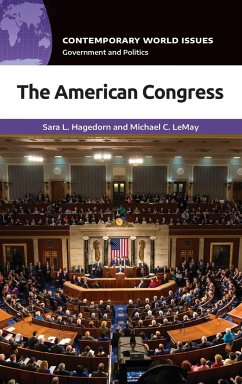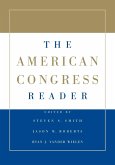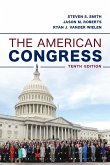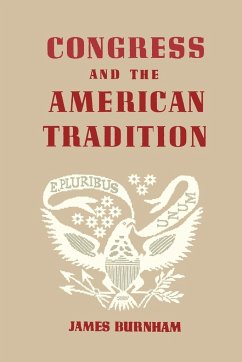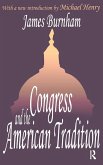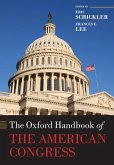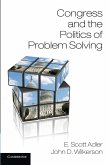- Gebundenes Buch
- Merkliste
- Auf die Merkliste
- Bewerten Bewerten
- Teilen
- Produkt teilen
- Produkterinnerung
- Produkterinnerung
This volume thoroughly examines the operations and politics of the U.S. Congress. It guides readers to their own assessment of congressional politics and provides them with the basis for future reading and study of the subject. The American Congress: A Reference Handbook covers Congress from its inception to the present day, discussing the constitutional functions of Congress and how they have evolved over time. It presents a detailed discussion of 15 problems with which Congress copes, some associated concerns with those problems, and how they might be resolved. The book opens with a brief…mehr
Andere Kunden interessierten sich auch für
![The American Congress Reader The American Congress Reader]() Steven S. SmithThe American Congress Reader66,99 €
Steven S. SmithThe American Congress Reader66,99 €![The American Congress The American Congress]() Steven S. SmithThe American Congress96,99 €
Steven S. SmithThe American Congress96,99 €![Congress and the American Tradition Congress and the American Tradition]() James BurnhamCongress and the American Tradition24,99 €
James BurnhamCongress and the American Tradition24,99 €![Congress and the American Tradition Congress and the American Tradition]() James BurnhamCongress and the American Tradition206,99 €
James BurnhamCongress and the American Tradition206,99 €![The Oxford Handbook of the American Congress The Oxford Handbook of the American Congress]() The Oxford Handbook of the American Congress70,99 €
The Oxford Handbook of the American Congress70,99 €![The American Legal Profession The American Legal Profession]() Christopher P. BanksThe American Legal Profession44,99 €
Christopher P. BanksThe American Legal Profession44,99 €![Congress and the Politics of Problem Solving Congress and the Politics of Problem Solving]() E. Scott AdlerCongress and the Politics of Problem Solving27,99 €
E. Scott AdlerCongress and the Politics of Problem Solving27,99 €-
-
-
This volume thoroughly examines the operations and politics of the U.S. Congress. It guides readers to their own assessment of congressional politics and provides them with the basis for future reading and study of the subject. The American Congress: A Reference Handbook covers Congress from its inception to the present day, discussing the constitutional functions of Congress and how they have evolved over time. It presents a detailed discussion of 15 problems with which Congress copes, some associated concerns with those problems, and how they might be resolved. The book opens with a brief history of Congress and how it has changed over time. It discusses a series of problems and concerns, and proposed solutions to those problems. It also comprises nine original essays by other scholars and persons involved in congressional politics as well as profiles of the major organizations and actors involved. Data and documents and a detailed chronology of Congress from 1789 to 2018 allow readers to situate significant legislation within the history of Congress, while an annotated list of sources-the major books and scholarly journals concerned with Congress in addition to a number of feature-length films and videos-provide readers with vetted resources for further study.
Hinweis: Dieser Artikel kann nur an eine deutsche Lieferadresse ausgeliefert werden.
Hinweis: Dieser Artikel kann nur an eine deutsche Lieferadresse ausgeliefert werden.
Produktdetails
- Produktdetails
- Verlag: Bloomsbury Publishing plc
- Seitenzahl: 406
- Erscheinungstermin: 30. Juni 2019
- Englisch
- Abmessung: 235mm x 157mm x 26mm
- Gewicht: 736g
- ISBN-13: 9781440865800
- ISBN-10: 1440865809
- Artikelnr.: 54921091
- Herstellerkennzeichnung
- Produktsicherheitsverantwortliche/r
- Europaallee 1
- 36244 Bad Hersfeld
- gpsr@libri.de
- Verlag: Bloomsbury Publishing plc
- Seitenzahl: 406
- Erscheinungstermin: 30. Juni 2019
- Englisch
- Abmessung: 235mm x 157mm x 26mm
- Gewicht: 736g
- ISBN-13: 9781440865800
- ISBN-10: 1440865809
- Artikelnr.: 54921091
- Herstellerkennzeichnung
- Produktsicherheitsverantwortliche/r
- Europaallee 1
- 36244 Bad Hersfeld
- gpsr@libri.de
Sara L. Hagedorn, PhD, is assistant professor of political science at the University of Colorado-Colorado Springs. Michael C. LeMay, PhD, is professor emeritus of political science at California State University-San Bernardino with 35 years experience teaching at the university level.
Preface
1 Background and History
Introduction
The Constitution-Based Functions and Powers of the American Congress and How They Have Changed over Time
The Changing Role of the Lawmaking Function of the American Congress
Lawmaking during the Early Years of Congress: 1789-1830
The Decentralized Congress: 1830-1860
The Rise of the Two-Party System and Evolution of the Modern Congress
1860-1920
The Textbook Congress: 1920-1970
The Reform Congress: 1980-2000
The Changing Role of Congressional Budget Powers Post-World War II
The Changing Role of the Representation Function
The Changing Role in Congressional War-Making Powers
The Changing Role in Congressional Oversight of the Other Branches
The Changing Role in the Advice and Consent
Treaty Approval
and Appointive Power
Conclusion
References
2 Problems
Controversies
and Solutions
Introduction
The Congressional-Presidential Relationship
Legislative Agenda
Veto and Override
War Powers
Advice and Consent
Impeachment
Institutional Rules
Norms
and Constraints
House-Senate Differences
Unanimous Consent
Holds
and Filibusters
Additional Differences
Drafting
Considering
and Passing Legislation
The Budget
Leadership
Committee Structure
Congressional Staff
Outside Influences
The Perpetual Campaign
Representation Conflicts
Interest Groups and Lobbyists
Partisan Considerations
Women and Minorities in Congress
Congressional Ethics
Solutions
References
3 Perspectives
Preparing for the Senate Confirmation Process Chad Calvert
Refocusing on Policy Dynamics Adam Cayton
The Importance of Increasing Women's Representation in the U.S. Congress Kathleen Dolan
Effective Tribal Advocacy: Sovereignty + Grassroots + Substance + Money Danna R. Jackson
Esq.
The President and the Congress Joshua Kennedy
Ideology in Congress Verlan Lewis
A Legacy of Women on Capitol Hill: Legislation and Leadership Summer Mersinger
The Marginalization of Congress Christina G. Villegas
4 Profiles
Introduction
Organizations
America Leads
American Federation of Labor and Congress of Industrial Organizations
Americans for Prosperity
Brookings Institute
CATO Institute
Club for Growth
Congressional Black Caucus
Congressional Budget Office
Congressional Hispanic Caucus
Congressional Research Service
Democratic Congressional Campaign Committee
Democratic National Committee
Democratic Senatorial Campaign Committee
EMILY's List
Federal Elections Commission
FreedomWorks for America
Government Accountability Office
Heritage Foundation
Majority Leader of the U.S. House and Senate
Minority Leader of the U.S. House and Senate
National Archives and Records Administration
National Republican Congressional Committee
National Republican Senatorial Committee
National Rifle Association
Office of Congressional Ethics
Office of Management and Budget
PEW Research Center
Republican National Committee
Senate Majority PAC
Speaker of the House
The Tea Party Movement
People
Abramoff
Jack (1958-)
Armey
Richard "Dick" (1940-)
Boehner
John (1949-)
Calhoun
John C. (1782-1850)
Cannon
Joseph Gurney (1836-1926)
Clay
Henry (1777-1852)
Collins
Susan (1952-)
Cruz
Rafael Edward "Ted" (1970-)
Dingell
John (1926-2019)
Feinstein
Dianne (1933-)
Gingrich
Newt (1943-)
Johnson
Lyndon B. (1908-1973)
Kennedy
Edward Moore "Ted" (1932-2009)
Koch
David (1940-)
Lieberman
Joseph (1942-)
Limbaugh
Rush (1951-)
Lujan
Ben Ray (1972-)
Madison
James (1751-1836)
Mansfield
Mike (1903-2001)
McCain
John (1936-2018)
McConnell
Mitch (1942-)
Murdoch
Rupert (1931-)
Murkowski
Lisa (1957-)
Norquist
Grover (1956-)
O'Neill
Thomas Philip
Jr. "Tip" (1912-1994)
Pelosi
Nancy (1940-)
Rankin
Jeannette (1880-1973)
Rayburn
Samuel Taliaferro (1882-1961)
Reid
Harry (1939-)
Ryan
Paul (1970-)
Sanders
Bernie (1941-)
Schumer
Charles "Chuck" (1950-)
Soros
George (1930-)
Trumka
Richard (1949-)
Van Buren
Martin (1782-1862)
Webster
Daniel (1782-1852)
5 Data and Documents
Data
Table 5.1 Partisan Control of Congress
Figure 5.1 Population per U.S. House District
Figure 5.2 U.S House and Senate Reelection Rates
1964-2018
Figure 5.3 Changes in Seats after the 2010 Census
Figure 5.4 Average Spending by Winner
1990-2016
Figure 5.5 Racial and Ethnic Diversity in Congress
Figure 5.6 Number of Women in the House and Senate
Figure 5.7 Number of Presidential Vetoes per Congress
Table 5.2 Declarations of War and Military Engagement by Congress
Table 5.3 Tie-Breaking Votes by the Vice President
Figure 5.8 Trust in the Legislative Branch
Documents
The Constitution of the United States
The Louisiana Purchase (1803)
The Missouri Compromise (1820)
Permanent Apportionment Act (1929)
U.S. Declaration of War against Japan (December 8
1941)
The War Powers Resolution (November 7
1973)
Establishment of the Congressional Budget Office (1974)
INS v. Chadha et al. (1983)
Clinton v. City of New York (1998)
Articles of Impeachment against William Jefferson Clinton (1998)
Authorization for the Use of Force (September 18
2001)
Honest Leadership and Open Government Act (2007)
6 Resources
Books
Leading Scholarly Journals
Nonprint Sources
Films
Videos
Websites
7 Chronology
Glossary
Index
About the Authors
1 Background and History
Introduction
The Constitution-Based Functions and Powers of the American Congress and How They Have Changed over Time
The Changing Role of the Lawmaking Function of the American Congress
Lawmaking during the Early Years of Congress: 1789-1830
The Decentralized Congress: 1830-1860
The Rise of the Two-Party System and Evolution of the Modern Congress
1860-1920
The Textbook Congress: 1920-1970
The Reform Congress: 1980-2000
The Changing Role of Congressional Budget Powers Post-World War II
The Changing Role of the Representation Function
The Changing Role in Congressional War-Making Powers
The Changing Role in Congressional Oversight of the Other Branches
The Changing Role in the Advice and Consent
Treaty Approval
and Appointive Power
Conclusion
References
2 Problems
Controversies
and Solutions
Introduction
The Congressional-Presidential Relationship
Legislative Agenda
Veto and Override
War Powers
Advice and Consent
Impeachment
Institutional Rules
Norms
and Constraints
House-Senate Differences
Unanimous Consent
Holds
and Filibusters
Additional Differences
Drafting
Considering
and Passing Legislation
The Budget
Leadership
Committee Structure
Congressional Staff
Outside Influences
The Perpetual Campaign
Representation Conflicts
Interest Groups and Lobbyists
Partisan Considerations
Women and Minorities in Congress
Congressional Ethics
Solutions
References
3 Perspectives
Preparing for the Senate Confirmation Process Chad Calvert
Refocusing on Policy Dynamics Adam Cayton
The Importance of Increasing Women's Representation in the U.S. Congress Kathleen Dolan
Effective Tribal Advocacy: Sovereignty + Grassroots + Substance + Money Danna R. Jackson
Esq.
The President and the Congress Joshua Kennedy
Ideology in Congress Verlan Lewis
A Legacy of Women on Capitol Hill: Legislation and Leadership Summer Mersinger
The Marginalization of Congress Christina G. Villegas
4 Profiles
Introduction
Organizations
America Leads
American Federation of Labor and Congress of Industrial Organizations
Americans for Prosperity
Brookings Institute
CATO Institute
Club for Growth
Congressional Black Caucus
Congressional Budget Office
Congressional Hispanic Caucus
Congressional Research Service
Democratic Congressional Campaign Committee
Democratic National Committee
Democratic Senatorial Campaign Committee
EMILY's List
Federal Elections Commission
FreedomWorks for America
Government Accountability Office
Heritage Foundation
Majority Leader of the U.S. House and Senate
Minority Leader of the U.S. House and Senate
National Archives and Records Administration
National Republican Congressional Committee
National Republican Senatorial Committee
National Rifle Association
Office of Congressional Ethics
Office of Management and Budget
PEW Research Center
Republican National Committee
Senate Majority PAC
Speaker of the House
The Tea Party Movement
People
Abramoff
Jack (1958-)
Armey
Richard "Dick" (1940-)
Boehner
John (1949-)
Calhoun
John C. (1782-1850)
Cannon
Joseph Gurney (1836-1926)
Clay
Henry (1777-1852)
Collins
Susan (1952-)
Cruz
Rafael Edward "Ted" (1970-)
Dingell
John (1926-2019)
Feinstein
Dianne (1933-)
Gingrich
Newt (1943-)
Johnson
Lyndon B. (1908-1973)
Kennedy
Edward Moore "Ted" (1932-2009)
Koch
David (1940-)
Lieberman
Joseph (1942-)
Limbaugh
Rush (1951-)
Lujan
Ben Ray (1972-)
Madison
James (1751-1836)
Mansfield
Mike (1903-2001)
McCain
John (1936-2018)
McConnell
Mitch (1942-)
Murdoch
Rupert (1931-)
Murkowski
Lisa (1957-)
Norquist
Grover (1956-)
O'Neill
Thomas Philip
Jr. "Tip" (1912-1994)
Pelosi
Nancy (1940-)
Rankin
Jeannette (1880-1973)
Rayburn
Samuel Taliaferro (1882-1961)
Reid
Harry (1939-)
Ryan
Paul (1970-)
Sanders
Bernie (1941-)
Schumer
Charles "Chuck" (1950-)
Soros
George (1930-)
Trumka
Richard (1949-)
Van Buren
Martin (1782-1862)
Webster
Daniel (1782-1852)
5 Data and Documents
Data
Table 5.1 Partisan Control of Congress
Figure 5.1 Population per U.S. House District
Figure 5.2 U.S House and Senate Reelection Rates
1964-2018
Figure 5.3 Changes in Seats after the 2010 Census
Figure 5.4 Average Spending by Winner
1990-2016
Figure 5.5 Racial and Ethnic Diversity in Congress
Figure 5.6 Number of Women in the House and Senate
Figure 5.7 Number of Presidential Vetoes per Congress
Table 5.2 Declarations of War and Military Engagement by Congress
Table 5.3 Tie-Breaking Votes by the Vice President
Figure 5.8 Trust in the Legislative Branch
Documents
The Constitution of the United States
The Louisiana Purchase (1803)
The Missouri Compromise (1820)
Permanent Apportionment Act (1929)
U.S. Declaration of War against Japan (December 8
1941)
The War Powers Resolution (November 7
1973)
Establishment of the Congressional Budget Office (1974)
INS v. Chadha et al. (1983)
Clinton v. City of New York (1998)
Articles of Impeachment against William Jefferson Clinton (1998)
Authorization for the Use of Force (September 18
2001)
Honest Leadership and Open Government Act (2007)
6 Resources
Books
Leading Scholarly Journals
Nonprint Sources
Films
Videos
Websites
7 Chronology
Glossary
Index
About the Authors
Preface
1 Background and History
Introduction
The Constitution-Based Functions and Powers of the American Congress and How They Have Changed over Time
The Changing Role of the Lawmaking Function of the American Congress
Lawmaking during the Early Years of Congress: 1789-1830
The Decentralized Congress: 1830-1860
The Rise of the Two-Party System and Evolution of the Modern Congress
1860-1920
The Textbook Congress: 1920-1970
The Reform Congress: 1980-2000
The Changing Role of Congressional Budget Powers Post-World War II
The Changing Role of the Representation Function
The Changing Role in Congressional War-Making Powers
The Changing Role in Congressional Oversight of the Other Branches
The Changing Role in the Advice and Consent
Treaty Approval
and Appointive Power
Conclusion
References
2 Problems
Controversies
and Solutions
Introduction
The Congressional-Presidential Relationship
Legislative Agenda
Veto and Override
War Powers
Advice and Consent
Impeachment
Institutional Rules
Norms
and Constraints
House-Senate Differences
Unanimous Consent
Holds
and Filibusters
Additional Differences
Drafting
Considering
and Passing Legislation
The Budget
Leadership
Committee Structure
Congressional Staff
Outside Influences
The Perpetual Campaign
Representation Conflicts
Interest Groups and Lobbyists
Partisan Considerations
Women and Minorities in Congress
Congressional Ethics
Solutions
References
3 Perspectives
Preparing for the Senate Confirmation Process Chad Calvert
Refocusing on Policy Dynamics Adam Cayton
The Importance of Increasing Women's Representation in the U.S. Congress Kathleen Dolan
Effective Tribal Advocacy: Sovereignty + Grassroots + Substance + Money Danna R. Jackson
Esq.
The President and the Congress Joshua Kennedy
Ideology in Congress Verlan Lewis
A Legacy of Women on Capitol Hill: Legislation and Leadership Summer Mersinger
The Marginalization of Congress Christina G. Villegas
4 Profiles
Introduction
Organizations
America Leads
American Federation of Labor and Congress of Industrial Organizations
Americans for Prosperity
Brookings Institute
CATO Institute
Club for Growth
Congressional Black Caucus
Congressional Budget Office
Congressional Hispanic Caucus
Congressional Research Service
Democratic Congressional Campaign Committee
Democratic National Committee
Democratic Senatorial Campaign Committee
EMILY's List
Federal Elections Commission
FreedomWorks for America
Government Accountability Office
Heritage Foundation
Majority Leader of the U.S. House and Senate
Minority Leader of the U.S. House and Senate
National Archives and Records Administration
National Republican Congressional Committee
National Republican Senatorial Committee
National Rifle Association
Office of Congressional Ethics
Office of Management and Budget
PEW Research Center
Republican National Committee
Senate Majority PAC
Speaker of the House
The Tea Party Movement
People
Abramoff
Jack (1958-)
Armey
Richard "Dick" (1940-)
Boehner
John (1949-)
Calhoun
John C. (1782-1850)
Cannon
Joseph Gurney (1836-1926)
Clay
Henry (1777-1852)
Collins
Susan (1952-)
Cruz
Rafael Edward "Ted" (1970-)
Dingell
John (1926-2019)
Feinstein
Dianne (1933-)
Gingrich
Newt (1943-)
Johnson
Lyndon B. (1908-1973)
Kennedy
Edward Moore "Ted" (1932-2009)
Koch
David (1940-)
Lieberman
Joseph (1942-)
Limbaugh
Rush (1951-)
Lujan
Ben Ray (1972-)
Madison
James (1751-1836)
Mansfield
Mike (1903-2001)
McCain
John (1936-2018)
McConnell
Mitch (1942-)
Murdoch
Rupert (1931-)
Murkowski
Lisa (1957-)
Norquist
Grover (1956-)
O'Neill
Thomas Philip
Jr. "Tip" (1912-1994)
Pelosi
Nancy (1940-)
Rankin
Jeannette (1880-1973)
Rayburn
Samuel Taliaferro (1882-1961)
Reid
Harry (1939-)
Ryan
Paul (1970-)
Sanders
Bernie (1941-)
Schumer
Charles "Chuck" (1950-)
Soros
George (1930-)
Trumka
Richard (1949-)
Van Buren
Martin (1782-1862)
Webster
Daniel (1782-1852)
5 Data and Documents
Data
Table 5.1 Partisan Control of Congress
Figure 5.1 Population per U.S. House District
Figure 5.2 U.S House and Senate Reelection Rates
1964-2018
Figure 5.3 Changes in Seats after the 2010 Census
Figure 5.4 Average Spending by Winner
1990-2016
Figure 5.5 Racial and Ethnic Diversity in Congress
Figure 5.6 Number of Women in the House and Senate
Figure 5.7 Number of Presidential Vetoes per Congress
Table 5.2 Declarations of War and Military Engagement by Congress
Table 5.3 Tie-Breaking Votes by the Vice President
Figure 5.8 Trust in the Legislative Branch
Documents
The Constitution of the United States
The Louisiana Purchase (1803)
The Missouri Compromise (1820)
Permanent Apportionment Act (1929)
U.S. Declaration of War against Japan (December 8
1941)
The War Powers Resolution (November 7
1973)
Establishment of the Congressional Budget Office (1974)
INS v. Chadha et al. (1983)
Clinton v. City of New York (1998)
Articles of Impeachment against William Jefferson Clinton (1998)
Authorization for the Use of Force (September 18
2001)
Honest Leadership and Open Government Act (2007)
6 Resources
Books
Leading Scholarly Journals
Nonprint Sources
Films
Videos
Websites
7 Chronology
Glossary
Index
About the Authors
1 Background and History
Introduction
The Constitution-Based Functions and Powers of the American Congress and How They Have Changed over Time
The Changing Role of the Lawmaking Function of the American Congress
Lawmaking during the Early Years of Congress: 1789-1830
The Decentralized Congress: 1830-1860
The Rise of the Two-Party System and Evolution of the Modern Congress
1860-1920
The Textbook Congress: 1920-1970
The Reform Congress: 1980-2000
The Changing Role of Congressional Budget Powers Post-World War II
The Changing Role of the Representation Function
The Changing Role in Congressional War-Making Powers
The Changing Role in Congressional Oversight of the Other Branches
The Changing Role in the Advice and Consent
Treaty Approval
and Appointive Power
Conclusion
References
2 Problems
Controversies
and Solutions
Introduction
The Congressional-Presidential Relationship
Legislative Agenda
Veto and Override
War Powers
Advice and Consent
Impeachment
Institutional Rules
Norms
and Constraints
House-Senate Differences
Unanimous Consent
Holds
and Filibusters
Additional Differences
Drafting
Considering
and Passing Legislation
The Budget
Leadership
Committee Structure
Congressional Staff
Outside Influences
The Perpetual Campaign
Representation Conflicts
Interest Groups and Lobbyists
Partisan Considerations
Women and Minorities in Congress
Congressional Ethics
Solutions
References
3 Perspectives
Preparing for the Senate Confirmation Process Chad Calvert
Refocusing on Policy Dynamics Adam Cayton
The Importance of Increasing Women's Representation in the U.S. Congress Kathleen Dolan
Effective Tribal Advocacy: Sovereignty + Grassroots + Substance + Money Danna R. Jackson
Esq.
The President and the Congress Joshua Kennedy
Ideology in Congress Verlan Lewis
A Legacy of Women on Capitol Hill: Legislation and Leadership Summer Mersinger
The Marginalization of Congress Christina G. Villegas
4 Profiles
Introduction
Organizations
America Leads
American Federation of Labor and Congress of Industrial Organizations
Americans for Prosperity
Brookings Institute
CATO Institute
Club for Growth
Congressional Black Caucus
Congressional Budget Office
Congressional Hispanic Caucus
Congressional Research Service
Democratic Congressional Campaign Committee
Democratic National Committee
Democratic Senatorial Campaign Committee
EMILY's List
Federal Elections Commission
FreedomWorks for America
Government Accountability Office
Heritage Foundation
Majority Leader of the U.S. House and Senate
Minority Leader of the U.S. House and Senate
National Archives and Records Administration
National Republican Congressional Committee
National Republican Senatorial Committee
National Rifle Association
Office of Congressional Ethics
Office of Management and Budget
PEW Research Center
Republican National Committee
Senate Majority PAC
Speaker of the House
The Tea Party Movement
People
Abramoff
Jack (1958-)
Armey
Richard "Dick" (1940-)
Boehner
John (1949-)
Calhoun
John C. (1782-1850)
Cannon
Joseph Gurney (1836-1926)
Clay
Henry (1777-1852)
Collins
Susan (1952-)
Cruz
Rafael Edward "Ted" (1970-)
Dingell
John (1926-2019)
Feinstein
Dianne (1933-)
Gingrich
Newt (1943-)
Johnson
Lyndon B. (1908-1973)
Kennedy
Edward Moore "Ted" (1932-2009)
Koch
David (1940-)
Lieberman
Joseph (1942-)
Limbaugh
Rush (1951-)
Lujan
Ben Ray (1972-)
Madison
James (1751-1836)
Mansfield
Mike (1903-2001)
McCain
John (1936-2018)
McConnell
Mitch (1942-)
Murdoch
Rupert (1931-)
Murkowski
Lisa (1957-)
Norquist
Grover (1956-)
O'Neill
Thomas Philip
Jr. "Tip" (1912-1994)
Pelosi
Nancy (1940-)
Rankin
Jeannette (1880-1973)
Rayburn
Samuel Taliaferro (1882-1961)
Reid
Harry (1939-)
Ryan
Paul (1970-)
Sanders
Bernie (1941-)
Schumer
Charles "Chuck" (1950-)
Soros
George (1930-)
Trumka
Richard (1949-)
Van Buren
Martin (1782-1862)
Webster
Daniel (1782-1852)
5 Data and Documents
Data
Table 5.1 Partisan Control of Congress
Figure 5.1 Population per U.S. House District
Figure 5.2 U.S House and Senate Reelection Rates
1964-2018
Figure 5.3 Changes in Seats after the 2010 Census
Figure 5.4 Average Spending by Winner
1990-2016
Figure 5.5 Racial and Ethnic Diversity in Congress
Figure 5.6 Number of Women in the House and Senate
Figure 5.7 Number of Presidential Vetoes per Congress
Table 5.2 Declarations of War and Military Engagement by Congress
Table 5.3 Tie-Breaking Votes by the Vice President
Figure 5.8 Trust in the Legislative Branch
Documents
The Constitution of the United States
The Louisiana Purchase (1803)
The Missouri Compromise (1820)
Permanent Apportionment Act (1929)
U.S. Declaration of War against Japan (December 8
1941)
The War Powers Resolution (November 7
1973)
Establishment of the Congressional Budget Office (1974)
INS v. Chadha et al. (1983)
Clinton v. City of New York (1998)
Articles of Impeachment against William Jefferson Clinton (1998)
Authorization for the Use of Force (September 18
2001)
Honest Leadership and Open Government Act (2007)
6 Resources
Books
Leading Scholarly Journals
Nonprint Sources
Films
Videos
Websites
7 Chronology
Glossary
Index
About the Authors

